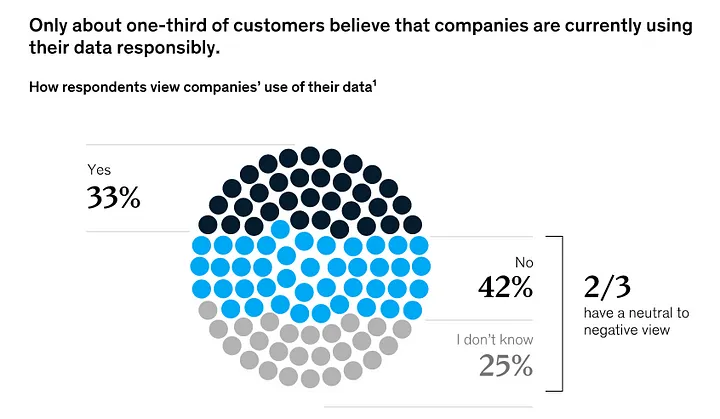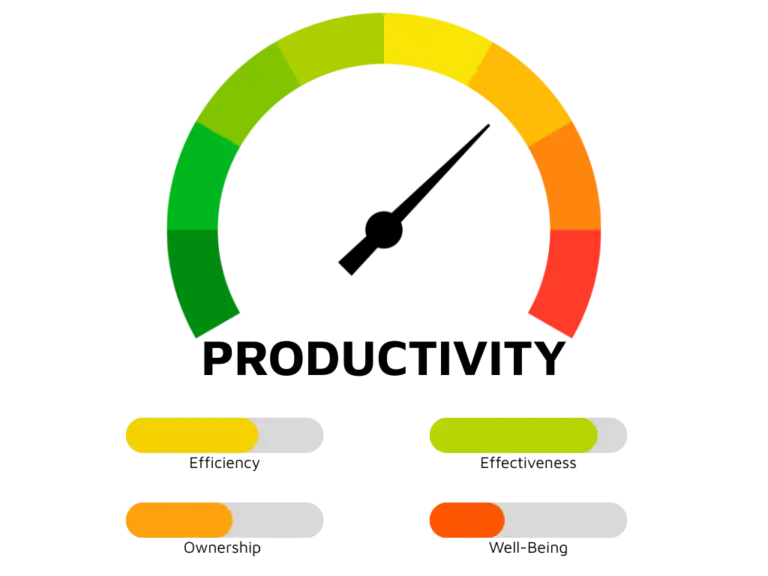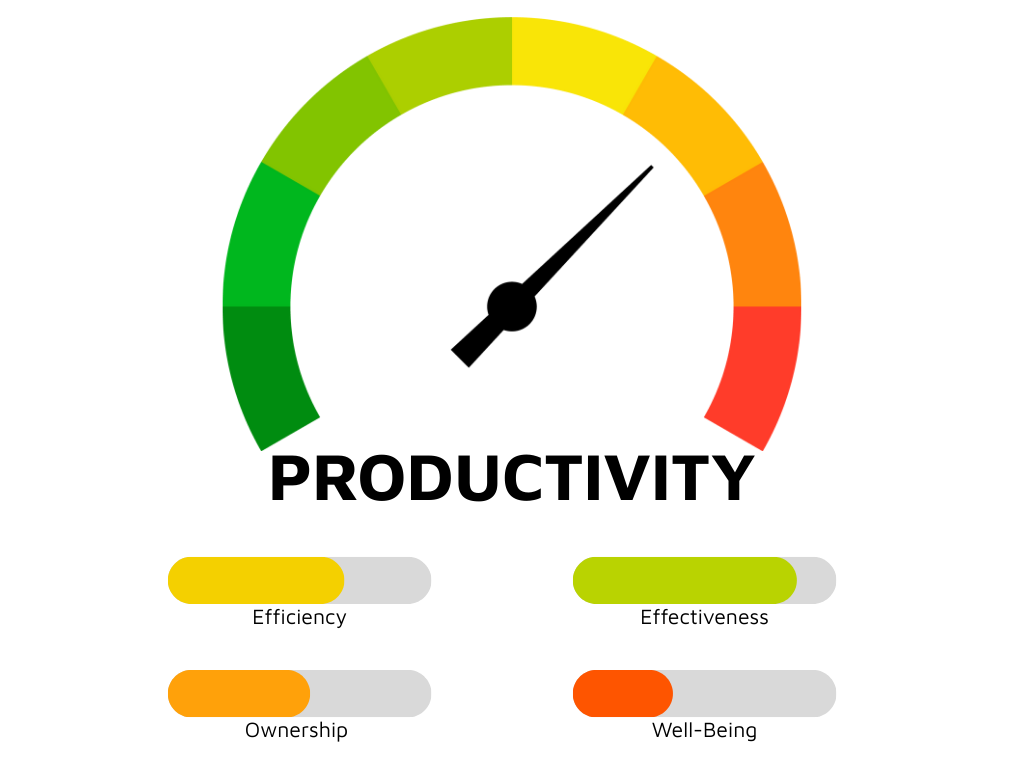The pace at that technology and humanity moves is unprecedented. The third industrial revolution started with technology that helped in our lives. But, in the late 90s (except Google and a few others), many couldn’t see that technology would create an enormous amount of data. Data that will power entire companies, eventually out gaming all the rest.
But there are changes on the horizon that could end the era of data-powered businesses: The advent of Blockchain, Web3 and the expansion of data privacy literacy.
The importance of Data for Companies
At this point, I am sure you know that whenever you do anything on the Internet (and also outside the Internet), you are giving your data. It can be in the form of anonymous information (think about visiting a website for the first time) or personal information (when you place an order and input your details). This data is then used to profile you and used in other activities like for example:
- Marketing & advertising: Personalized offers, dynamic prices, re-targeting.
- Market research: New products, company expansion to new regions or markets.
- CRM: Customer service, sales pipelines.
- Feed machine learning models that power Artificial Intelligence.
- Or it is sold for any of the purposes mentioned above.
The Data Party
These are the different types of data collected digitally:
- First-Party Data: First-party data is any (voluntarily) directly shared by the user with a company. This can include information such as name, email address, contact information, and demographic data. First-party data is often used to personalize marketing content and improve user experience.
- Second Party Data: Two companies share data privately, hopefully with user consent. This data type is often used to target advertising campaigns and improve the accuracy of predictive analytics models.
- Third-Party Data: Third-party data is any data not voluntarily shared by the user. This data type can be obtained from public records, social media, purchase behaviour, and web browsing.
- Zero-Party Data: Zero-party data is data that customers deliberately share with you.
Blockchain and Web3
Blockchain means decentralized and anonymous. You can visit a website, buy and get delivery without a trace. That leaves the seller with money in the pocket but without the valuable (personal) information. Therefore the fuel that is powering many company engines today will stop pouring.
Blockchain and Web3 are a paradigm change where companies need to keep fuel flowing to their engines.
The Rapidly Increasing Consideration for Data Privacy
Not long ago it was totally ok to give your details to any company and do not worry about it. Remember personality test games on Facebook? Well, Market Research companies pay fortunes for this kind of information, and we were doing it for fun.
Today, in 2022, asking for personal details is becoming a big ask.

I recently went to buy a toaster at a big electronics shop. At the time of paying, the lady at the counter started with a barrage of questions.
“In which city do you live? Street? Post Code? Phone number? National ID number?”
I asked her why she needed to get all this personal information to buy a toaster?.
“It is company policy, we are obliged to question, and by the way, if you want to buy the toaster, you need to tell me. Otherwise, I can’t complete the sale.”
I left the toaster at the counter.
I went to the dentist a few days later, and things got even worse. In the patient registration interview, he asked me about all of the above and beyond:
- “What is your yearly income?”
- “Are you married?”
- “What does your wife do for a living?”
- “How many people live in your household.”
I was utterly shocked. I stopped him and politely asked: “Why do you ask all these?”
“This is a company process. If you don’t want to share this data, you can opt-out of marketing activities after the interview.
Wait for a second: You already stored all my data…
Another well-known problem is some companies little ethics and how they effortlessly share your data. For example, have you ever bought something and then your phone starts ringing with insurance offers, loans or bargain mobile plans?
Cybercrime
Cybercrime is reported to account for $6 trillion in 2021.
We all have heard about stealing money or hacking into accounts. Even worse is the case of phishing or ransomware. Unfortunately, it is unclear how a company will use your data or if they have the proper security mechanisms to avoid a breach.
Apple and their Quest for Data Privacy
Apple has packed iOS 14 with privacy features. From hiding your email to stop sharing your location.
Marketers are fuming, and Telco providers plan to sue Apple in Europe for the upcoming Private Relay feature.
But Apple is well known for not stepping back, and the new generations of communication devices will indeed have tighter privacy features.
What is Zero-Party Data Marketing
A form of Marketing where consumers consciously and purposely give their data because:
- They value the Brand/Product/Service, and they want to be part of it.
- They get perks (offers, discounts, etc.) for giving away their data.

Zero-Party Data Marketing Examples
- Join the newsletter and get a 20% on your next purchase.
- Register and get a preference to buy the firsts PlayStation 6.
- Add your birth date and receive a gift on your birthday.
- Forage offer free courses from top tier consultancy and companies in exchange for demographics and psychographics. It is not mandatory to answer any questions. (Thanks toYoussef Srondyfor the tip)
- Loyalty actions like accruing points or discounts.
How to start with Zero-Party Data Marketing?
Put your Customer first. Under which circumstances are they willing to offer their data? What is in for them?
The answer will point you in the right direction. For example, some general ideas could be:
- Incentivizing Survey Responses: Surveys are a vital part of a company research initiatives. Offering a discount, free delivery, or gift wrapping could increase the response rate.
- Social Responsibility: Send an amount to a charity in exchange for personal data.
- Environment: Plant a tree or offset the CO2 carbon footprint for customers details.
- Honor a Promise: Give us your details and if our marketing “sucks” we will delete all your data with one-click.
Conclusion
Customers concerns about their data are already happening.
Generations born during the digital age are privacy literate. And every day, more consumers decide to ditch Brands with shady data practices in favour of transparency.
So it seems a matter of (not too much) time to standardize Zero-Party data as best practice.





